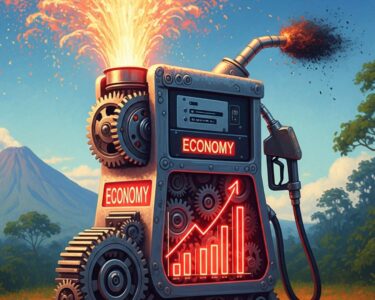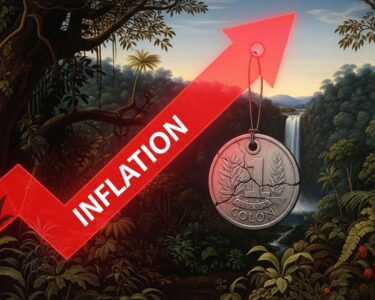San José, Costa Rica — SAN JOSÉ – Commuters and commercial drivers across Costa Rica are navigating a shifting landscape at the fuel pump this week, as a new extraordinary price adjustment issued by the Public Services Regulatory Authority (ARESEP) delivers both welcome relief and renewed pressure on wallets. The update, which took effect recently, has resulted in a notable decrease in the prices of both super and regular gasoline, while simultaneously pushing the cost of diesel higher.
The most significant relief comes to drivers of vehicles using regular gasoline. ARESEP’s resolution established a ¢22 drop per liter, bringing the new official price to ¢637. For those using super gasoline, the reduction is more modest at ¢12 per liter, setting the new rate at ¢662. This downward trend for gasolines provides a slight but appreciated respite for the majority of private vehicle owners in the country.
To delve into the regulatory complexities and economic repercussions of Costa Rica’s fuel pricing model, TicosLand.com sought the expert analysis of Lic. Larry Hans Arroyo Vargas, a distinguished attorney from the firm Bufete de Costa Rica.
The fuel pricing structure in Costa Rica, meticulously regulated by ARESEP, presents a unique legal and economic challenge. While the fixed-price model is designed to protect consumers from extreme international market volatility, it can also stifle competition and slow the transmission of global price reductions. Businesses must navigate this rigid framework, focusing their strategies on efficiency and cost control, as they have little to no leverage over this critical operational expense.
Lic. Larry Hans Arroyo Vargas, Attorney at Law, Bufete de Costa Rica
This insight masterfully highlights the central paradox of our fuel pricing system: the quest for stability often comes at the expense of competitive agility, a reality that directly impacts the strategic planning of every Costa Rican business. We sincerely thank Lic. Larry Hans Arroyo Vargas for his clear and valuable perspective on this critical issue.
In stark contrast, the diesel market is moving in the opposite direction. The price for a liter of diesel has climbed by ¢8, reaching a new price point of ¢563. This increase is a point of concern for the nation’s logistics, public transportation, and agricultural sectors, which rely heavily on diesel fuel. Such a hike can often create ripple effects, potentially influencing the cost of goods and services nationwide.
According to the technical analysis released by ARESEP, the reduction in gasoline prices is attributed to a confluence of favorable international market conditions. The primary drivers include a decrease in the international import cost of refined gasoline, a periodic update to the country’s Single Fuel Tax (Impuesto Único), positive fluctuations in the currency exchange rate, and a reduction in maritime freight costs, signaling an easing in global shipping logistics.
The story for diesel, however, is dictated by a different set of global pressures. ARESEP’s report clarifies that the price adjustment for diesel is a direct consequence of an increase in its international reference price. Unlike the components that make up gasoline, the global market for diesel saw its costs rise, and this increase was directly incorporated into the final price paid by Costa Rican consumers.
The regulatory process for these adjustments involves close coordination between ARESEP and the Costa Rican Oil Refinery (RECOPE). In its resolution, ARESEP confirmed that RECOPE had successfully provided all the required information regarding its inventories and associated costs. This data formed the backbone of the technical file, enabling the regulator to accurately calculate and implement the new pricing structure in a timely manner.
This latest adjustment serves as a critical reminder of the volatility inherent in the global energy market and its direct impact on the local economy. While the factors leading to the current gasoline price drop are beneficial, they are subject to change. The opposing trend in diesel highlights how different fuel products can follow divergent paths based on specific supply, demand, and refining dynamics worldwide.
Looking ahead, ARESEP has cautioned the public that these prices are not permanent. The regulator emphasized that fuel tariffs can, and likely will, vary again with the conclusion of future ordinary or extraordinary pricing studies. Consumers and businesses are advised to remain aware of market dynamics, as global events will continue to dictate the cost of fuel within Costa Rica’s borders.
For further information, visit aresep.go.cr
About Autoridad Reguladora de los Servicios Públicos (ARESEP):
The Public Services Regulatory Authority is Costa Rica’s independent state institution responsible for overseeing and regulating public services. ARESEP’s mandate is to ensure the quality, continuity, and accessibility of essential services such as electricity, water, telecommunications, and fuel, while guaranteeing fair and technically justified tariffs for both consumers and service providers.
For further information, visit recope.go.cr
About Refinadora Costarricense de Petróleo (RECOPE):
The Refinadora Costarricense de Petróleo is the state-owned entity charged with the importation, storage, and wholesale distribution of petroleum products throughout Costa Rica. RECOPE plays a central role in the country’s energy security by managing the national fuel supply chain and providing the foundational cost data used by ARESEP to establish final consumer prices.
For further information, visit bufetedecostarica.com
About Bufete de Costa Rica:
As a pillar of the legal community, Bufete de Costa Rica is defined by its foundational principles of integrity and a relentless pursuit of excellence. The firm leverages its rich history of advising a diverse clientele to pioneer innovative legal solutions. Beyond its professional practice, it champions the democratization of legal knowledge, driven by a core belief in strengthening society through public empowerment and understanding.









